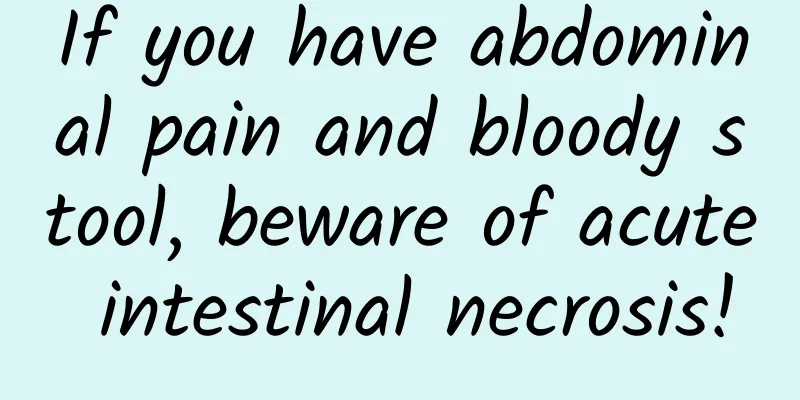If you have abdominal pain and bloody stool, beware of acute intestinal necrosis!

|
Author: Tang Qin, Deputy Secretary-General of the Science Popularization Expert Committee of the Chinese Medical Association, Researcher Reviewer: Wang Changyuan, Chief Physician, Xuanwu Hospital, Capital Medical University In life, most people may have experienced sudden abdominal pain, which sometimes gets better quickly and many people don’t take it too seriously. However, if you feel unbearable abdominal pain and have bloody stools, you should go to the hospital for diagnosis and treatment in time and be alert to the occurrence of acute intestinal necrosis. Figure 1 Copyright image is not authorized for reproduction 1. Causes of acute intestinal necrosis Acute intestinal necrosis is often caused by surgical acute abdomen. It is intestinal tissue necrosis caused by obstruction of blood flow in the intestinal wall. The onset time can vary from a few hours to a few days depending on the cause. Early diagnosis is difficult and the condition is dangerous. There are many complications and a high mortality rate, so it needs to be taken seriously. The following are common clinical surgical acute abdomens that can cause acute intestinal necrosis. 1. Intestinal obstruction Once the intestinal tract is obstructed, the anatomical and functional changes will hinder the venous return of the intestinal wall, causing congestion and ischemia of the intestinal mucosa, which in turn aggravates intestinal wall edema and causes intestinal dilatation. As the intestinal dilatation worsens, the blood supply of the intestinal wall arteries is affected, which can lead to intestinal wall hypoxia, loss of intestinal villi, and degeneration and necrosis. 2. Incarcerated hernia The pressure of the hernia defect ring on the hernia contents blocks the venous return of the hernia contents. If there is intestinal tract in the hernia sac, it will cause congestion, edema and ischemia of the intestinal tract. Eventually, the arterial blood flow of the intestinal tract is blocked, leading to intestinal ischemia and necrosis, resulting in a strangulated hernia. 3. Mesenteric thrombosis Under normal conditions, the blood supply to the intestine mainly relies on the superior mesenteric artery, inferior mesenteric artery and mesenteric vein. When thrombosis forms in these blood vessels, it will block the blood vessels, affect blood circulation, and cause intestinal ischemia, congestion, and even necrosis. 4. Volvulus Intestinal torsion can easily lead to closed loop intestinal obstruction, which in turn can cause intestinal ischemia, necrosis or perforation, with a high mortality rate. 5. Intussusception Acute intussusception can quickly lead to complete intestinal obstruction, and strangulation and intestinal necrosis may occur within 1 to 2 days. This acute abdomen is common in infants under 2 years old, and is most common in infants aged 4 to 10 months. Therefore, when infants at this stage cry violently for no reason for more than several hours and the crying stops and starts, parents should take the infant to the hospital in time to avoid delaying the condition. 6. Inflammatory bowel disease Including ulcerative colitis and Crohn's disease. Since the disease cannot be completely cured and recurs repeatedly, it is easy to cause persistent damage to the intestines, and in severe cases may cause intestinal obstruction and then acute intestinal necrosis. The above-mentioned types are all acute intestinal necrosis caused by diseases of the intestinal tract itself. In addition, there are some diseases that are not caused by the intestinal tract itself that can also cause acute intestinal necrosis, including closed abdominal injuries, digestive system tumors, etc. Figure 2 Copyright image is not authorized for reproduction 2. Clinical manifestations of acute intestinal necrosis From the perspective of the causes of acute intestinal necrosis, as long as surgical acute abdomen causes intestinal obstruction, it may cause acute intestinal necrosis, and its clinical manifestations mainly include the following aspects. 1. Persistent abdominal pain The abdominal pain comes from the strong peristalsis of the intestine. The more intestinal necrosis there is, the more frequent the abdominal pain will be, until it becomes continuous and intense, sometimes accompanied by paroxysmal exacerbations and no relief period. Colonic necrosis is closed-loop, so the pressure in the intestinal cavity is extremely high, which can manifest as obvious distension and pain. 2. Abdominal bloating Patients with high-position intestinal necrosis usually do not have obvious abdominal distension, while patients with low-position intestinal necrosis have more obvious abdominal distension in the middle and lower abdomen, and sometimes intestinal patterns and peristaltic waves can be seen. For intestinal necrosis caused by colon obstruction, because the colon is "M" shaped, abdominal distension is also full-abdominal, but tenderness is more severe in the periphery of the abdomen. 3. Nausea and vomiting When acute intestinal necrosis occurs, severe abdominal pain can cause nausea and reflex vomiting. The vomitus of patients with high intestinal necrosis is mainly gastric juice, intestinal juice and bile, often accompanied by obvious dehydration, low sodium, low potassium and other manifestations; the vomitus of patients with low intestinal necrosis is initially gastric juice, and then turns into fecal juice with a foul odor, and sometimes the vomitus can be brown or bloody; in colon necrosis, vomiting is usually mild or no vomiting. 4. Stop passing gas and defecation through the anus The conditions for the cessation of anal gas and defecation are opposite to those for vomiting. In patients with high intestinal necrosis, there is still a lot of chyme and feces below the necrotic area, and the intestines can still move, so the cessation of gas and defecation occurs later; in patients with low intestinal necrosis, the cessation of gas and defecation occurs earlier, and sometimes due to the large amount of exudate, bloody or jam-like stools may also form. 5. Abdominal tenderness, rebound pain, and muscle tension Patients with acute intestinal necrosis may experience varying degrees of abdominal tenderness, rebound pain, and muscle tension. During abdominal auscultation, bowel sounds are usually weak, and sometimes a "blowing-like" systolic or continuous murmur can be heard in the upper abdomen or around the umbilicus. 6. High fever, low blood pressure, or even coma Acute intestinal necrosis can also cause systemic pathophysiological changes, which mainly develop around water and electrolyte imbalance, infection, shock, etc., forming various symptoms and signs, such as high fever, hypotension, coma, etc. In addition, a blood test for patients with acute intestinal necrosis can reveal a significant increase in white blood cells; abdominal ultrasound or CT examinations can reveal fluid accumulation in the abdominal cavity and significant thickening of the intestinal wall; diagnostic abdominal puncture examinations can reveal clear, light red or dark red fluid accumulation (mostly dark red fluid accumulation). For patients with abdominal pain and bloating, they need to be alert to the possibility of intestinal necrosis when the amount of urine suddenly decreases despite adequate fluid replacement. Treatment of acute intestinal necrosis Fasting and deprivation of water : For patients with acute intestinal necrosis whose symptoms are not severe, fasting and deprivation of water are generally adopted first to reduce intestinal gas and fluid accumulation, lower intra-abdominal pressure, improve intestinal wall and systemic blood circulation, and also make the intestine retract, which is conducive to intraoperative identification. Intravenous rehydration : The most common symptoms of patients with acute intestinal necrosis are water loss, sodium loss and potassium loss. The total amount and composition of the infusion can be determined according to the specific condition to achieve the purpose of intravenous rehydration and nutritional support, and it can also correct water and electrolyte disorders. Figure 3 Copyright image, no permission to reprint Anti-infection treatment : Antibiotics are usually required to avoid or treat infections caused by acute intestinal necrosis. Surgery : For patients with intestinal perforation or severe intestinal necrosis, early surgery is the key to treatment. Among them, patients with mesenteric thrombosis need to use heparin anticoagulation in the early postoperative period to prevent the re-formation of thrombus. The early clinical manifestations of acute intestinal necrosis are very similar to those of intestinal obstruction, and sometimes even difficult to distinguish. Therefore, when intestinal obstruction or other conditions that may cause intestinal obstruction occur, in addition to taking active treatment measures, it is also necessary to pay attention to whether the patient has the possibility of intestinal necrosis so that timely intervention measures can be taken. References [1] Ding Xuezhong, Lu Yiming. Emergency Medicine (2nd Edition). Beijing: People's Medical Publishing House, 2021. [2] Chi Zhaochun. Diagnosis, differential diagnosis and treatment of abdominal pain. Beijing: People's Medical Publishing House, 2021. [3] Ni Xin, Sun Ning, Wang Weilin. Zhang Jinzhe Pediatric Surgery (2nd edition). Beijing: People's Medical Publishing House, 2020. |
<<: Can natural remedies relieve rhinitis? Here are some proven and effective methods!
>>: If someone around you suddenly feels dizzy and nauseous, how should you provide first aid?
Recommend
What are the taboos for eating plum blossoms? What are the flavors of plum blossoms?
Plum, orchid, bamboo and chrysanthemum are the fo...
Dabigatran and aspirin can both prevent cerebral infarction, but their indications are different
Several friends have consulted Huazi, saying that...
Do most women inherit their high noses from their fathers?
Facial features are a basic condition that people...
Simple breast enhancement method
I believe that many female friends want to have f...
How to treat oily hair and hair loss in women
Oily hair is mainly caused by disordered sebaceou...
How many days after menstruation does a woman ovulate?
If you want to get pregnant as soon as possible, ...
Nausea and vomiting after two days of delayed menstruation
Nausea and vomiting are common conditions, but if...
The correct way to take Mafulong to regulate menstruation
Marvelon is a hormone that can be used for contra...
Which is better, homemade hot pot soup base or ready-made hot pot soup base? What is the most fragrant hot pot soup base?
The temperature of the hot pot is relatively high...
Breast milk vs. formula milk, is it possible for formula milk to replace breast milk?
Going back to work after maternity leave is a cho...
Can wearing disposable masks prevent the unknown pneumonia in Wuhan? What kind of masks are effective in preventing the unknown pneumonia in Wuhan?
We all know that a serious outbreak of unknown pn...
Sudden back pain after medical abortion half a month ago
If the pregnancy is not long-term and the menstru...
Why are my underwear yellow and smelly?
In life, some women will find that their underwea...
Are bruises on the body caused by ghosts? Why are girls more likely to get bruises than boys? Here is the expert's explanation →
gossip When I woke up, I saw purple and blue spot...
There is a lump in the woman's chest
We all know that women’s breasts are very soft, e...









